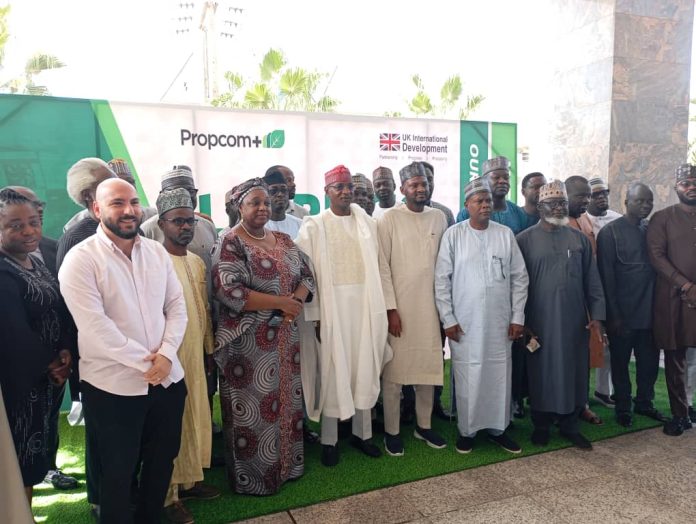A UK-sponsored agricultural intervention project in Nigeria, Propcom+, has set an ambitious target of improving the income of four million Nigerians by 2030.
This they hope to achieve through increased access to bio-fortified seeds, veterinary vaccination and strengthening of agribusinesses.
The programme, which commenced in 2023 under the sponsorship of the UK Foreign, Commonwealth and Development Office, FCDO, has an initial funding of £95 million and hopes to leverage £122 million in private funding.
Political Director and Country Representative of Propcom+, Dr Adiya Ode, disclosed this in Kano, on Thursday, at a one-day learning event, organised by Propcom+ for agribusiness owners, agricultural market actors, policymakers, and farmers on its interventions in Northern Nigeria.
Ode noted that the objective of Propcom+ is to transform the rural economy, improve agricultural productivity and resilience of people who depend on agriculture for a livelihood, as well as reduce emissions and conflicts over natural resources.
According to her, the organisation aims to achieve that objective by stimulating markets through its market systems development approach.
She clarified that Propcom+ does not intervene directly with the markets but works with market actors and facilitates them, adding that Propcom+ thinks the approach is more sustainable.
“We are implementing for 8 years. We are in our second year and the program will close in 2030.
“By the time the programme closes, we hope to have impacted the lives and improved the incomes of four million Nigerians.
“That’s an ambitious target but we know that working with our partners, we can achieve this target.
“We also have a financial target. We hope that the funding for Propcom+, which is £95 million, would leverage £122 million in private financing,” she said.
Also speaking, the Kano State Commissioner of Agriculture and Natural Resources, Dr Danjuma Yankatsari, said Propcom+’s achievements were evident as even independent evaluators can testify that the programme has benefited a lot of small scale farmers.
Yankatsari noted that the focus on small-scale farmers and women tallies with programmes initiated by other organisations such as IFAD and Islamic Development Bank in the state.
He noted that local farmers were exposed to environmental hazards, but efforts by Propcom+ programme, IFAD and Islamic Development Bank, in addition to the state’s own local programme, would help in achieving the desired result.
According to him, the state has achieved a lot through the intervention of Propcom+ programme and other partners in crop production, crop protection, expanding irrigation facilities, spreading climate resilient seed, modern farming technics and provision of farming equipment, as well as creation of different cattle routes and provision of fodder.
He further stated that because of its focus on women and small-scale farmers, the programme will reach the kind of vulnerable people more exposed to climate change.
On his part, Propcom+’s Strategy Director, Mr Olamide Ojo, said the organisation has a robust basket of programmes to implement policies, regulations, laws, formal or informal, to work with business actors to make good use of the business environment.
He said that in the past seven months, some partners have been working with Propcom+ to scale up the various models earlier implemented in its makarfi project.
He expressed hope that at the expiration of the project after 8 years, 4.1 million Nigerians would have been positively affected.
Key agenda at the workshop were “Scaling last-mile delivery of vaccines through the Community Animal Health Worker and Veterinary Para-professional Model, Public-private partnership framework on routine vaccination, Scaling community seed multiplication models and Scaling rural seed promoters’ model.”
A total of nine panelists x-rayed benefits, accessibility, and challenges around the models with emphasis on community engagement, public private sector partnership, and funding to ensure their successful implementation.









